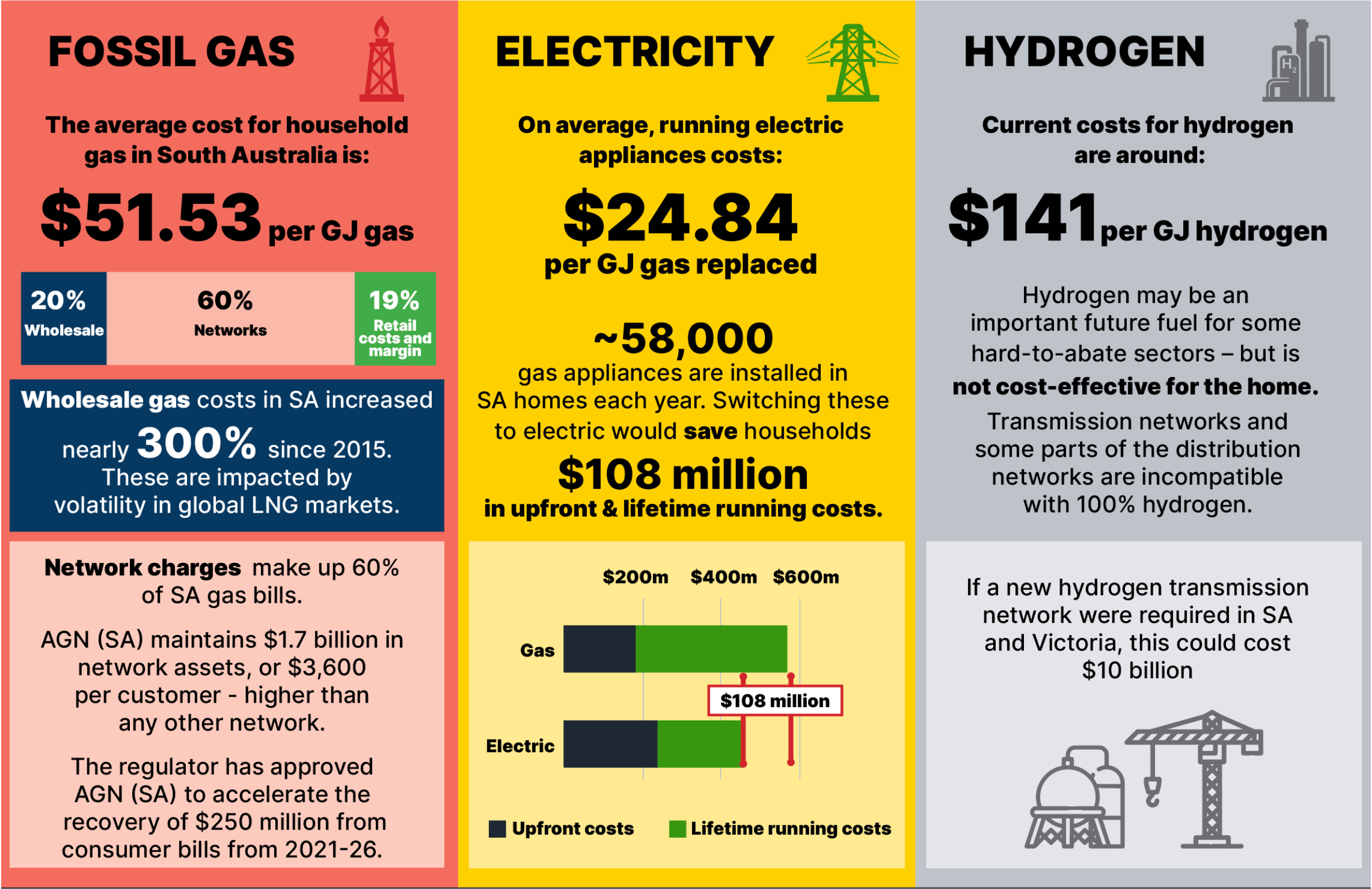Getting off gas and going all electric could slash rising energy bills for SA homes

Key Takeaways:
South Australian households are facing upward pressure on their gas prices, with rising wholesale costs and expensive network charges.
All-electric homes are the most cost-effective option in South Australia, and consumers could collectively save $108 million over the lifetime of their heating, hot water and cooking appliances for every year that efficient electric appliances are installed instead of gas appliances.
Although hydrogen may become an important fuel in some sectors, it is not economical for households, and its near-term role in South Australia’s gas distribution network is likely to be negligible.
14 March 2024 – (IEEFA Australia): A new IEEFA fact sheet highlights the costs faced by South Australian homes that consume gas, and compares the alternatives.
South Australian gas is facing upward price pressures. Wholesale costs have risen 300% since 2015, and South Australians pay some of the highest prices in Australia to access the gas network.
As new homes are connected to the gas network, and existing homes purchase new gas appliances, they are being locked into these high prices. They are also exposed to risks if the gas network were to become stranded in future.
The fact sheet highlights that switching to efficient electric appliances is the most economical option for most South Australian homes when their existing gas appliances wear out. This includes appliances such as reverse-cycle air conditioners, heat pump hot water systems and induction cooktops.
“An efficient electric appliance can be between two and six times more efficient than the equivalent gas appliance, which means consumers end up spending about half as much in energy costs to do the same job,” says Jay Gordon, Energy Finance Analyst at IEEFA.
“Over the lifetime of the appliance, these low running costs end up offsetting the higher upfront cost of the electric appliance.”
The fact sheet draws from IEEFA analysis that found an estimated 58,000 gas appliances are installed in South Australian homes each year. If these homes were transitioned to efficient electric alternatives instead, those consumers would end up saving $108 million over the lifetime of their appliances.
South Australia is a global leader in the uptake of renewable electricity, and recently announced an accelerated target of 100% net renewable electricity by 2027.
“South Australia’s enviable share of renewable electricity gives it a strategic advantage. Tapping into this supply means it can lower consumer bills as well as contributing to its emission reduction targets,” says Gordon.
The fact sheet also looks at the option of replacing household gas with hydrogen. While hydrogen shows potential as a valuable future fuel for certain industries, it presents one of the highest cost pathways for households.
“The technical challenges of introducing hydrogen into gas distribution networks presents a major barrier,” Gordon says.
“Today’s gas appliances aren’t compatible with high levels of hydrogen, meaning that the current gas network is limited to blends of up to 3% hydrogen for the foreseeable future.
“Switching to 100% hydrogen would require a co-ordinated switch over of gas appliances in all South Australian homes. We don’t know how much this would cost households, as unlike efficient electric appliances, hydrogen-ready appliances aren’t yet on the market.”
These findings for South Australia are consistent with IEEFA’s analysis in other states and territories, which generally finds that all-electric homes leave consumers financially better off, while alternative gases such as hydrogen and biomethane are not economical for households.
See the fact sheet: As gas bills rise in South Australia, all-electric homes are the most cost-effective solution
Media contact: Amy Leiper, [email protected]
Author contact: Jay Gordon, [email protected]
About IEEFA: The Institute for Energy Economics and Financial Analysis (IEEFA) examines issues related to energy markets, trends, and policies. The Institute’s mission is to accelerate the transition to a diverse, sustainable and profitable energy economy. (ieefa.org)











